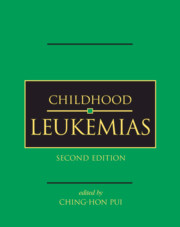Book contents
- Frontmatter
- Contents
- List of contributors
- Preface
- Part I History and general issues
- Part II Cell biology and pathobiology
- Part III Evaluation and treatment
- Part IV Complications and supportive care
- 29 Acute complications
- 30 Late complications after leukemia therapy
- 31 Therapy-related leukemias
- 32 Infectious disease complications in leukemia
- 33 Hematologic supportive care
- 34 Pain management
- 35 Psychosocial issues
- 36 Nursing care
- Index
- Plate Section between pages 400 and 401
- References
32 - Infectious disease complications in leukemia
from Part IV - Complications and supportive care
Published online by Cambridge University Press: 01 July 2010
- Frontmatter
- Contents
- List of contributors
- Preface
- Part I History and general issues
- Part II Cell biology and pathobiology
- Part III Evaluation and treatment
- Part IV Complications and supportive care
- 29 Acute complications
- 30 Late complications after leukemia therapy
- 31 Therapy-related leukemias
- 32 Infectious disease complications in leukemia
- 33 Hematologic supportive care
- 34 Pain management
- 35 Psychosocial issues
- 36 Nursing care
- Index
- Plate Section between pages 400 and 401
- References
Summary
Introduction
Children with leukemia experience the common infections of childhood – such as upper respiratory tract infection, otitis media, and gastroenteritis – which are generally managed in the same manner as those occurring in the immunocompetent host. However, the immunocompromised status of many of these children leaves them susceptible to various opportunistic infections, which generally occur at times when the host defense mechanisms are at nadirs of efficiency. This chapter reviews the factors that contribute to infectious complications in patients with leukemia and suggests strategies for the prevention and management of these infections.
Defects in the host defense mechanisms associated with leukemia
Numerous factors contribute to the decreased efficacy of the host defense mechanisms in patients with leukemia. The malignancy itself and the therapeutic modalities necessary for a successful outcome can affect the physical barriers to infection, impair immune system functioning, disrupt cytokine mediators, and alter the normal microbiological flora. A major defense against infection is the integrity of the mucosal membranes and the integument, which act as biologic barriers against potential pathogens. Breaches in these barriers provide ready access for endogenous microbiological flora and other opportunistic pathogens. Venipuncture, catheter entry sites, bone marrow aspirates, mucosal ulcerations, and mucositis are common defects in these important barriers encountered in patients with leukemia.
A variety of deficiencies may occur in the immune system of patients with leukemia, including impaired humoral antibody responses, impaired cell-mediated immunity, quantitative and qualitative phagocytic defects, and the disruption of cytokine mediators.
- Type
- Chapter
- Information
- Childhood Leukemias , pp. 805 - 828Publisher: Cambridge University PressPrint publication year: 2006

